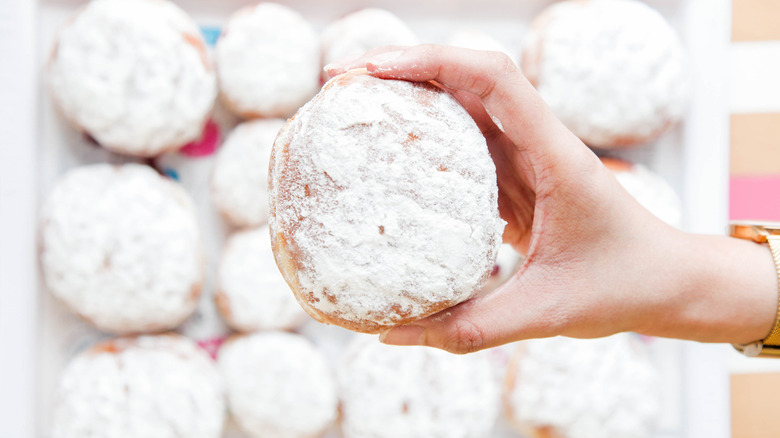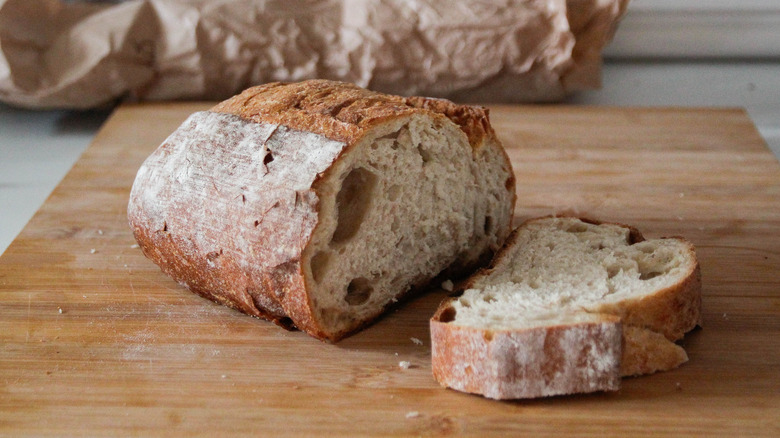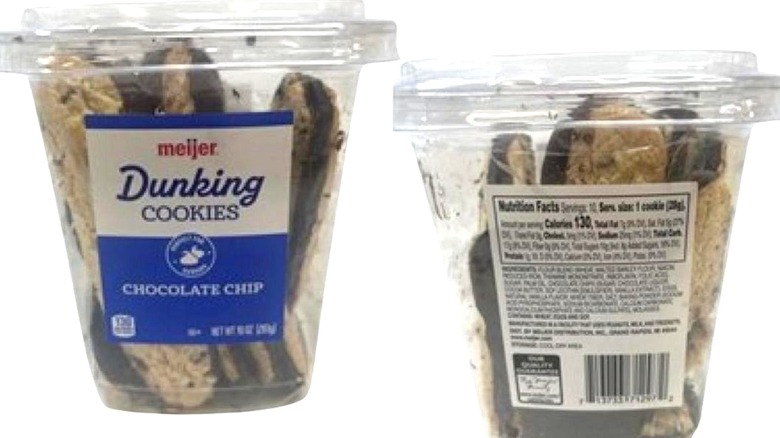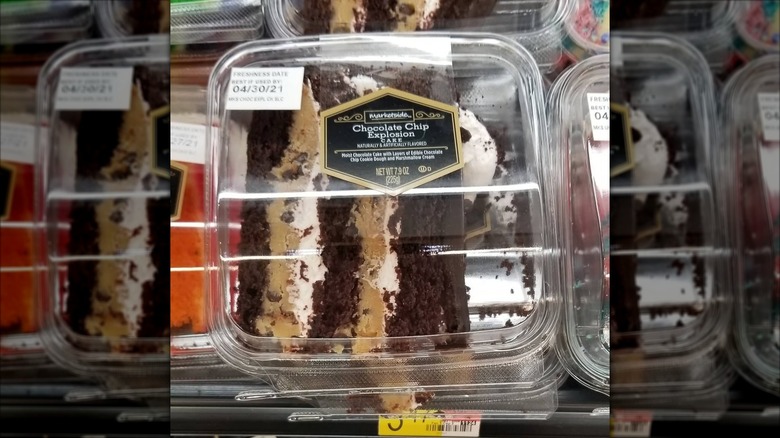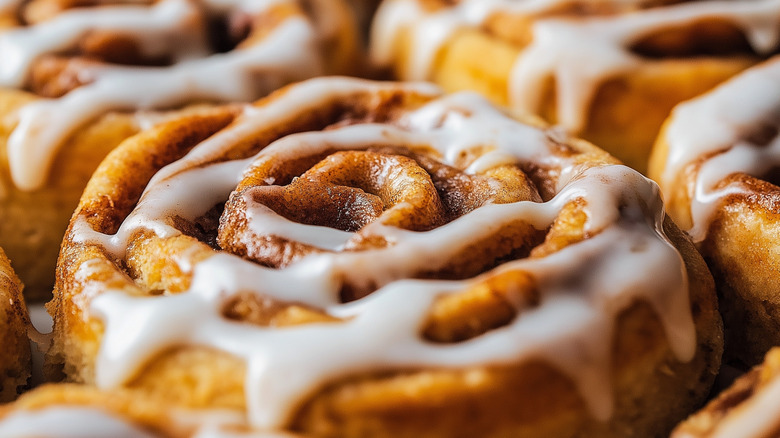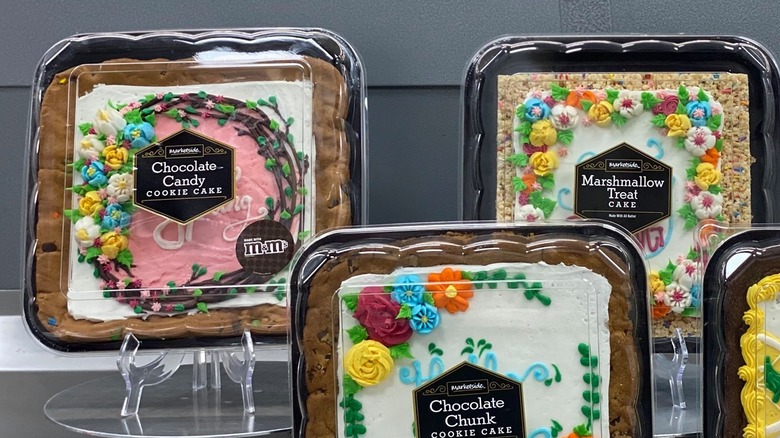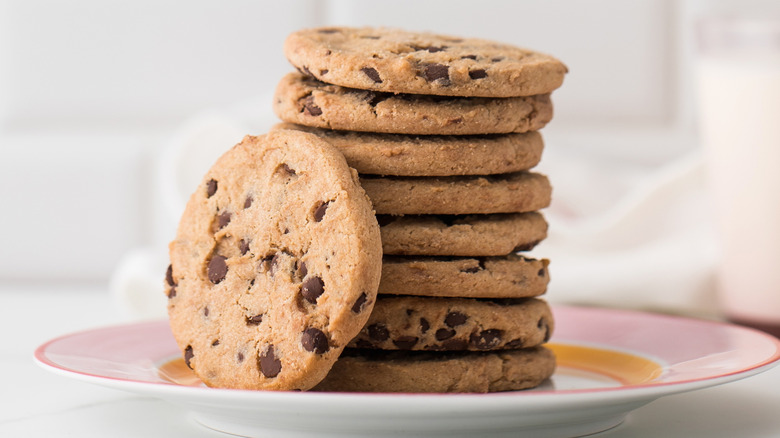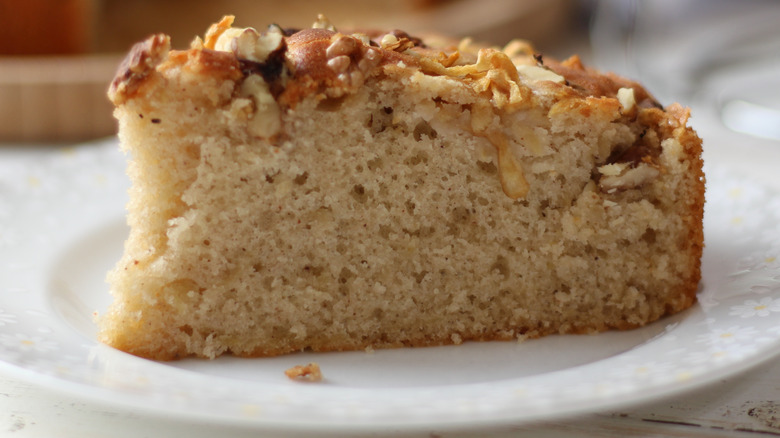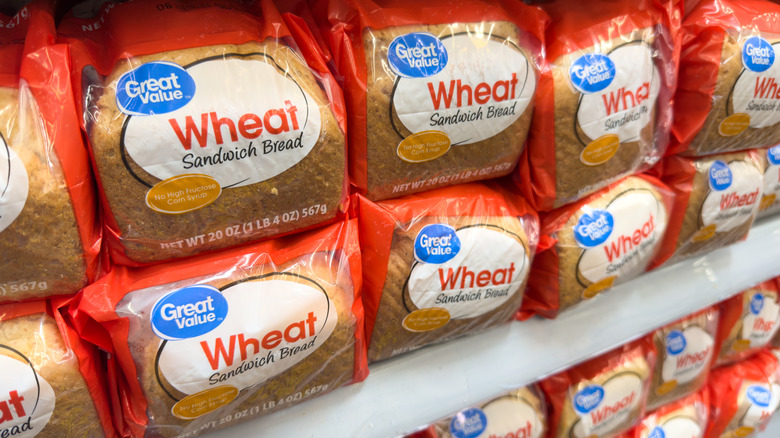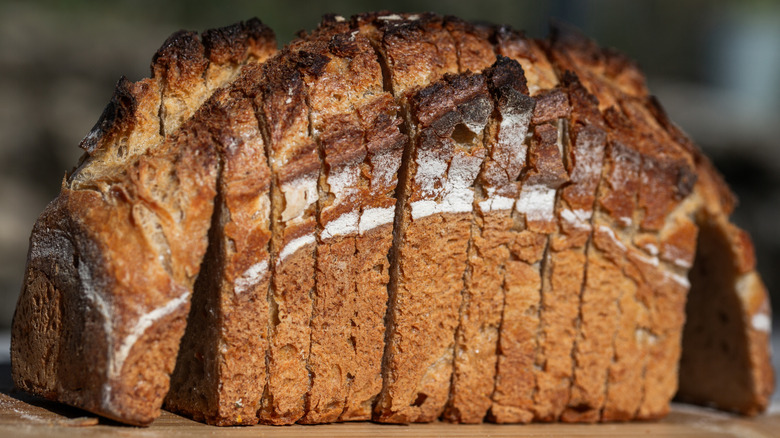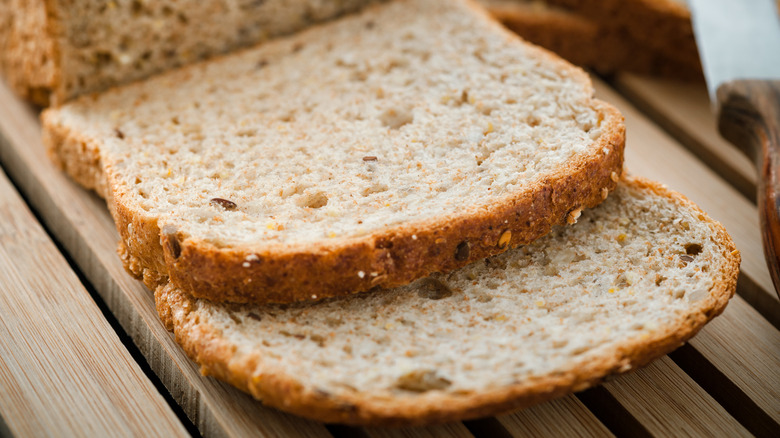15 Of The Biggest Grocery Store Bakery Item Recalls In US History
Usually, picking up cookies, brownies, or a cake from your local grocery store is exciting. After all, most of us love a sweet treat every now and again. that more than half of Americans regularly purchase baked goods like cakes and pastries, while around 40% like to eat cookies and cakes at least once weekly.
But one thing that is guaranteed to ruin the fun? Something inside your baked goods that isn't meant to be there. We're talking sinister things like undeclared allergens, foodborne bacteria, and even pieces of metal and plastic. Unfortunately, this has happened a few times in the past. Not just to cakes and other sweet treats, but also to savory baked goods, like sourdough and hot dog buns, too.
If you're concerned about the safety of your favorite bakery treat, it's a good idea to keep an eye on the latest food recalls. If there is an issue, brands and retailers are often quick to pull items from the shelves before they can cause injuries or health problems. To demonstrate that, we've rounded up some of the biggest grocery store baked goods recalls in history.
More than 2 million cases of donuts recalled from stores nationwide, including Walmart and Publix, because of listeria fears (2025)
For most people, eating a donut is a pleasurable experience. But, unfortunately, sometimes even this simple treat doesn't come without risk. In January 2025, Canadian company FGF had to more than 2 million cases of donuts sold across the U.S. due to fears they might contain a harmful strain of bacteria called listeria. If consumed, listeria can lead to an infection called , which has symptoms like fever, chills, vomiting, and diarrhea.
The were being sold under several brand names, including Publix, Walmart, and Dunkin' Donuts. Fortunately, none of the actual products sold under any of these brands actually tested positive for listeria. The recall was actually issued in an abundance of caution after traces of the bacteria were found in one of FGF's donut-producing facilities in the U.S.
Aldi recalled 9,500 cases of sourdough loaves due to potential plastic contamination (2024)
The ancient Egyptians had plenty to worry about. Parasites, diseases, injuries from manual work building pyramids — But one thing they didn't have to worry about? Plastic turning up in their sourdough bread (yep, records show that this popular variety of loaf really is that old). Unfortunately, in 2024, Aldi customers did have to worry about this sort of thing.
In August 2024, Izzio Artisan Bakery had to 9,500 cases of Aldi Mixed Sourdough loaf from stores in seven states (Illinois, Michigan, Texas, Ohio, New Jersey, Florida, and Arizona) due to fears they might contain plastic. The Colorado bakery also had to recall 600 cases of its own Izzio Everything Sourdough and 450 cases of Izzio Everything Roll for the same reason. Anyone who had already purchased any of the products was urged not to consume them, and instead return them to the store or throw them out.
It's not known exactly how the plastic found its way into the sourdough, but it was due to issues like broken packaging materials or factory equipment. This kind of issue is not uncommon. In fact, plastic is the most common foreign object to cause a food recall.
Meijer recalled chocolate chip dunking cookies from stores in 6 states due to undeclared milk (2024)
Dunking cookies, as the name suggests, are ideal for dunking in everything from . If you've got a milk allergy, you might opt for a dairy-free drink for your dunking cookie, like say, oat or almond milk, to keep yourself safe and avoid an allergic reaction. But sadly, you can only do so much. Sometimes, products get sent out to store shelves from the manufacturer with undeclared allergens, like milk, which puts allergy-sufferers unknowingly at risk from a .
Unfortunately, this was exactly what happened in 2024 with Meijer's chocolate chip dunking cookies. The cookies, produced by Californian company Too Good Gourmet, had to be from Meijer stores in six states after it was discovered that they contained milk that had not been declared on the packaging. Milk is one of the most allergens in the U.S. and should always be declared on product packaging. Fortunately, despite the fact that around , there were no reported allergic reactions as a result of the labeling error.
Aldi recalled more than 11,800 cases of chocolate chip muffins over allergy fears (2024)
There are nine common allergens in the U.S. Alongside milk, : eggs, fish, shellfish, tree nuts, peanuts, wheat, soybeans, and sesame. To keep people safe from allergic reactions (which are often mild, but in rare cases, can be life-threatening), all of these food groups should always be listed on product labels. But as we saw with the Meijer cookies incident, this doesn't always happen.
In the same year as the Meijer recall, FGF Brands Inc had to more than 11,800 cases of chocolate chip muffins from Aldi stores across the U.S. because they contained walnuts, a type of tree nut, that had not been listed on the packaging. In this particular case, the error was put down to a temporary issue in FGF Brands Inc's packaging process. As well as the recall, the company was instructed to stop producing the chocolate chip muffins until the problem had been fixed.
Fortunately, while tree nut allergies are common (impacting up to ), there were no reported adverse reactions as a result of the packaging mistake. To be on the safe side, anyone who had already purchased the muffins was urged to return them to the Aldi store they bought them from for a refund.
Walmart recalled nearly 1,000 units of cakes due to undeclared allergen (2023)
Publix isn't the only store to be involved in a packaging mix-up. Also in 2023, there were mistakes made with cake products sold at Walmart, which ultimately resulted in a . The issue stemmed back to one of the major retailer's suppliers, David's Cookies. The company shipped out 960 units of Marketside Chocolate Chip Explosion Cakes to Walmart stores across the U.S., only they didn't actually contain chocolate chip cakes at all. They contained Marketside Ultimate Peanut Butter Chocolate Cake. Of course, this could lead to consumer disappointment, but it was also a serious health risk. After all, peanuts are a common allergen.
In a bid to keep customers safe, David's Cookies issued a recall for all 960 units of the cakes. Luckily, nobody reported any allergic reactions as a result of the cake mix-up. Those without peanut allergies were likely safe to consume the cake, but anyone can experience an allergic reaction for the at any time, particularly to peanuts. To be on the safe side, anyone who had already purchased the cake was urged to return it to Walmart for a full refund.
H-E-B recalled brownie bites from stores in Texas and Mexico due to metal contamination (2022)
Earlier, we mentioned that in 2024, Aldi customers were alerted to pieces of plastic in their sourdough bread, but plastic isn't the only foreign object that can sneak its way into baked goods. In 2022, anyone who had bought brownie bites from H-E-B or Joe V's Smart Shops was potentially at risk from biting down on metal. To try and reduce the chances of that happening, H-E-B the brownie bites from stores in Texas and Mexico.
H-E-B had purchased the brownies from an outside supplier, where it's likely that the metal contamination due to broken machinery or wire in the factory where they were produced. If consumed, metal can cause mouth or dental injuries, or even internal cuts. In some cases, surgery could even be required to remove the metal.
Before the recall was issued, two customers complained about finding metal in their brownie bites. As a result, anyone who had already purchased the brownies was urged to either throw them away or return them to H-E-B or Joe V's Smart Shops for a refund.
Kroger recalled Country Oven baked goods from stores in 29 states because of metal contamination concerns (2021)
Kroger is no stranger to food recalls. The grocery store giant, which has stores across the U.S., has had to pull products from the shelves for various different reasons, including salmonella fears and undeclared allergens. Like H-E-B, it has also been faced with metal lurking in its food. In 2021, it had to baked goods sold under its Country Oven brand, including cinnamon rolls, chocolate cake, cheese pockets, and fudge cakes, from stores in 29 states due to fears they might contain metal fragments.
As mentioned above, metal in food presents a serious risk of injury. It can cause internal cuts or mouth and dental injuries. In this particular case, the metal fragments were linked to some of the starch that was used in the baked goods.
This also isn't the first time that metal contamination has caused a Kroger recall. In 2019, it also had to pull Tyson chicken strips from the shelves after metal fragments were found in the meat by consumers.
Walmart recalled cookie cakes from stores in 23 states due to undeclared peanuts (2021)
Two years before the Marketside Chocolate Chip Explosion Cake recall, Walmart was involved in another for cakes. Again, it was for cakes sold under its Marketside brand. But this time, the product in question was a Chocolate Candy Cookie Cake, and it was produced by a supplier called Jimmy's Cookies. In this instance, there were concerns that the packaging of the cake did not list a key allergen, peanuts. If a person with an allergy consumes a product with peanuts unknowingly, they are at risk of mild and severe reactions, including anaphylaxis, which in rare cases, can be life-threatening.
To protect allergy-sufferers, Jimmy's Cookies recalled the Chocolate Candy Cookie Cakes from Walmart stores in 23 states. Fortunately, at the time of the recall, nobody had reported any allergic reactions as a result of consuming the recalled products. Customers were urged to return the cakes to their local Walmart store for a full refund.
Multiple stores, including Walmart, recalled buns from stores in 18 states over plastic contamination concerns (2019)
On a few occasions, burgers and hot dogs have been recalled from the market. Some of the biggest hot dog recalls in the U.S., for example, have been linked to issues like under-processing, undeclared allergens, and foodborne illness. Hamburgers have also been pulled from the shelves for similar reasons. But sometimes, it's not the meat at all that's the problem, it's the bun.
In 2019, Flowers Foods Inc had to recall hot dog and burger buns from several stores in 18 states due to fears they contained pieces of hard plastic. The contamination meant that anyone who purchased and ate the buns was at risk of choking, , or dental injuries from the plastic fragments. At the time of the , the buns had already been shipped out to multiple stores, including 7-Eleven and Walmart. Other products affected by the recall notice included dinner rolls and BBQ bread.
Fortunately, there were no injuries reported as a result of anyone consuming the buns. But, again, as always, customers were urged not to eat the products and instead, either throw them away or return them for a refund.
Walmart and H-E-B recalled Swiss rolls from stores nationwide over salmonella concerns (2018)
Swiss rolls are harmless, right? It turns out, not always. In another Flower Foods recall, this time in 2018, the soft sweet treats were in Walmart, H-E-B, and other stores across the U.S. due to fears that they might contain salmonella, a harmful strain of foodborne bacteria. If consumed, salmonella can lead to , which is a disease that affects the intestine. The symptoms are usually mild but unpleasant, and include things like diarrhea and stomach cramps.
At the time of the recall, the potentially salmonella-contaminated Swiss rolls had been sold to stores under a variety of brands, including Baker's Treat and Market Square. Anyone who had bought the recalled rolls was urged to throw them away to reduce the risk of illness.
In this particular case, no instances of salmonellosis were reported. However, it's difficult to know if nobody got sick, because that most people don't report salmonella infections. In fact, for every person who tests positive for the disease, there are likely around 30 people who have it but haven't reported it to the authorities. This might be because their symptoms were manageable, or in some cases, so mild that they didn't notice they had them.
Trader Joe's recalled chocolate chip cookies from 13 states due to undeclared allergen (2018)
Like most grocery stores, Trader Joe's has had to deal with a number of recalls in its time. Items have been pulled from the shelves for varying reasons, including contamination with rocks (yes, rocks), foodborne bacteria concerns, and undeclared allergens. This was the case in 2018, when the retailer had to baked goods because of undeclared peanuts. In this case, it was to do with a packaging error at one of its suppliers, Chris's Cookies. It turns out, the company had shipped out Trader Joe's Peanut Butter Chocolate Chip Cookies to stores in 13 states in the wrong packaging. They had been packaged inside the Trader's Chocolate Chip Cookie bags by mistake.
The packaging error undeniably put customers with a peanut allergy at risk. However, it's important to note that in this particular incident, the chocolate chip cookie packaging did feature a "may contain" warning, although it did not list peanuts in the ingredient list. Anyone with a peanut allergy was urged not to consume the cookies, and instead return them for a refund. Fortunately, despite the prevalence of peanut allergies across the U.S., nobody reported any allergic reactions as a result of consuming the recalled products.
Publix recalled apple coffee cakes from stores in 6 states due to potential metal contamination (2016)
Metal pieces were the cause of yet another baked goods recall in 2016. This time, Publix had to its Publix Apple Coffee Cakes from stores in six states over concerns that they might contain metal shavings. Fortunately, nobody had been injured by the contaminant at the time of the recall, but again, as per usual, consumers were told they could return the cakes to their local Publix store for a full refund.
It wasn't confirmed exactly how the metal found its way into the cakes, but this was likely due to at the factory where they were produced. Unfortunately, this is not the only time that Publix has had to pull products from its shelves due to metal contamination.
Just one year after the cake incident, the retailer was implicated in a recall of ground turkey. Again, the issue was related to the potential presence of metal shavings inside the product. Fortunately, as with the cake recall, nobody reported any injuries as a result of the contaminant.
Bimbo Bakeries USA recalled bread from stores in 11 states, including Kroger, Aldi, and Walmart, because of broken glass (2015)
In 2015, Bimbo Bakeries USA that consumers had found something unexpected in its bread products: broken glass. As a result, the company had to recall multiple bread products from stores in , including Kroger, Aldi, and Walmart, to protect consumers. The affected brands included Kroger's private label, Walmart's Great Value, Sara Lee, Nature's Harvest, Aldi's L'oven Fresh, and Bimbo.
If consumed by accident, broken glass is . It can cause oral or internal cuts and injuries, and in extreme cases, may require surgery to remove.
Fortunately, even though Bimbo Bakeries USA received complaints about the glass from three different consumers, there were no injuries reported. Glass can find its way into food from many different sources, like broken bottles or jars, for example. But in this particular case, the source was thought to be a broken lightbulb in Bimbo Bakeries USA's processing facilities.
Aldi bread sold in stores in 24 states was recalled due to potential wire contamination (2013)
Unfortunately, the 2015 Bimbo Bakeries USA recall was the second recall in two years for the company. In 2013, the bread supplier also had to issue a for bread products sold from stores nationwide due to fears that they could contain pieces of flexible wire mesh. The affected brands included Arnold, Brownberry, Stroehmann Dutch Country, Sara Lee, Farm Bread, Harmons, and Aldi's L'oven Fresh.
Aldi has sold the recalled bread in stores in 24 states in total. However, in this particular case, it wasn't the bread on the shelves that was recalled, but products that had already been purchased by consumers.
Once again, the error was caused by broken equipment. This time, it wasn't a lightbulb, but a at one of Bimbo Bakeries USA's flour suppliers. Much like glass, if consumed, the wire threat of causing oral and internal injuries.
Sara Lee recalled 27 bread products from stores in 8 states, including Publix, due to metal contamination concerns (2007)
In 2007, Sara Lee was involved in yet another recall. This time, the company had to 27 whole wheat bread products from eight states. Grocery store chain Publix's private label was one of the brands affected, alongside Sara Lee Hearty & Delicious, Sara Lee Delightful, and EarthGrains.
There are many ways that metal can contaminate food, but it is usually due to broken pieces of machinery. In this particular case, the recall was issued due to fears that a metal screen, used to sift flour, had broken in one of Sara Lee's flour suppliers and contaminated the bread. In a bid to keep people safe from harmful injuries, anyone who had already purchased any of the affected products was urged to return them to the store they bought them from for a refund.

